Following the trail of Internet Explorer 6, does Google Chrome fail?
Thanks to the popularity of Android and more and more users of Chrome on Windows and Mac, Chrome is currently the most popular browser on every device. As Google continues to dominate the cyber world, information obtained from search engines and their services like Gmail or YouTube has become a rich source of nutrition for their own tools.
Although in the early days, Google was the king of web standards for many other browsers, but recently, they themselves ignored these standards and forced users to choose Chrome.
In other words, Chrome is on the way like Internet Explorer 6 before - when many web developers prioritize Chrome first, then for other browsers.
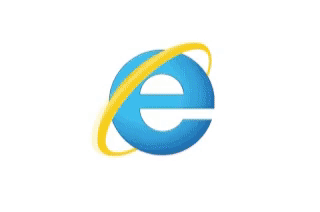
What Chrome is doing has turned them into Internet Explorer 6's successors
To understand specifically, look at the browser history to see what happened to IE6 in the early 2000s.
Briefly about browser history
16 years ago, Microsoft computers dominated with Windows. Along with Intel, Microsoft spent at least $ 1 billion to promote Windows XP, with TV commercials featuring Madonna. At that time, there was no iPod, Gmail or YouTube and Google wasn't even a rival to Microsoft. They behaved as if they were kings and wanted to do anything. After the departure of Netscape, Internet Explorer 6 was born.

Internet Explorer 6 first appeared on Windows XP
IE6 first appeared on Windows XP. As XP grows, so does the web. IE6 was born soon after the dot-com bubble collapsed and the number of Internet users in the United States increased. For many people, Internet Explorer is the only way to get online and the blue logo is synonymous with the Internet. At the highest point, IE6 dominates 90% of the browser market.
- Let Dot Com not become Dot-Bom
- History of Microsoft Windows operating system throughout the ages
Microsoft controls how users access the web and with Internet Explorer 6, they start reaching out. As the web gets more popular, the standards are gradually set to help developers and site creators run on multiple devices and browsers. IE6 ignores almost all of those standards, making it difficult for Microsoft and developers years to come.
Ignoring web standards means developers have to code their pages based on IE and encourage users to access the site with IE. IE6 lasted for 5 years with some security flaws and completely ignored web standards, until an opponent appeared.
In 2004, the Mozilla Foundation, founded by a former Netscape developer, released Firefox 1.0. It browses the web with tabs, has a pop-up blocker, and fans call for donations to pay for ads for Firefox in the New York Times. This is a precursor to the death of Internet Explorer and a real competitor since Netscape.
- The browser makers switch all Web Documentation to Mozilla's port
- Mozilla stopped supporting Firefox for Windows XP and Vista in June 2018
Microsoft returned to Internet Explorer 7 in 2006, adding tabbed browsing and other features, making most people still use it as the default browser on Windows. IE7 has not improved much on web standards and criticism around this began to increase. Even the father of the World Wide Web, Tim Berners-Lee also criticized.
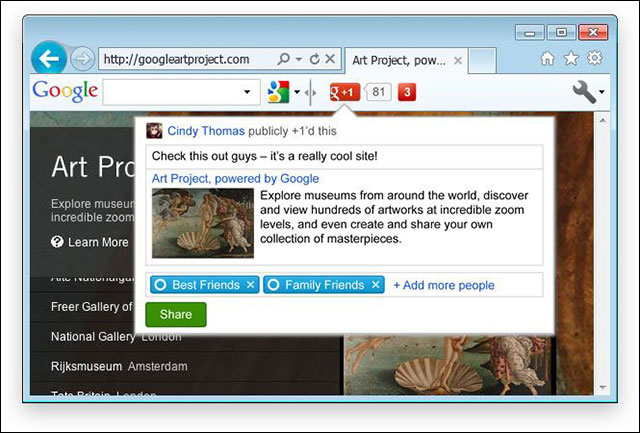
Later Google joined the browser market
When Firefox released, Google was rapidly developing search engines and advertising businesses. Instead of creating a browser of their own, they're busy creating Google Toolbar. (This is one of the first major projects led by the current CEO, Mr. Sundar Pichai). Toolbar is an add-on for Internet Explorer and Firefox, which adds a pop-up blocker and easy access to Google's search feature.
- Journey to become Google CEO of Sundar Pichai
- After 11 years, Internet Explorer 6 is still "king".
It's like a Trojan horse, adding features to the browser and directing users to Google services. They promoted a lot on search engine pages and pop-up blockers became very popular with IE6 users.
As Firefox grew and concerns about IE increased, Google entered the market in 2008 with Chrome browser. Google focuses on web standards and respects HTML5, passes two Acid1 and Acid2 tests with the first release - something that Microsoft couldn't do.
Developers switched to Chrome because it allowed them to make websites easier than based on web standards, and from there began the battle for market share between Internet Explorer, Firefox and Chrome.
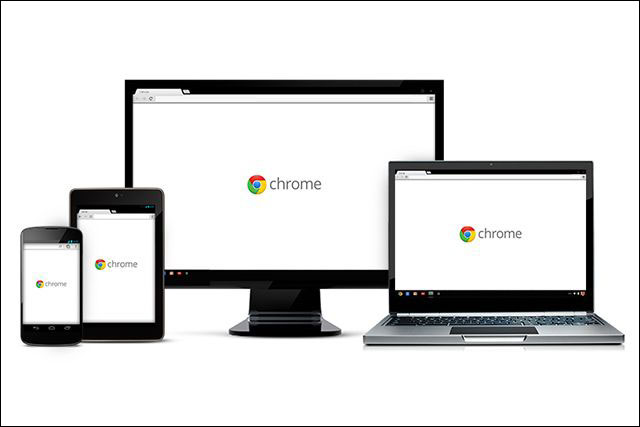
Not 90%, but Chrome is still dominating the browser market
Although Chrome never captured 90% of the browser market share, they still dominate all devices today. Netmarketshare, W3Counter and StatCounter all set Chrome's market share at around 60%, while Safari, Firefox, IE and Edge are far behind with a maximum of 14%.
- W3C ignores all criticisms and approves the EME standard for copyright content restrictions
- Is Firefox Quantum faster than Chrome? This is a detailed test result!
No matter who you choose to follow, Chrome is gaining the dominance of IE in the past. Yet we see Google's applications leave the web, just like Microsoft did more than a decade ago.
- Goodbye Chrome, we switch to Firefox
Works best (or can only work) on Chrome
Whether you blame Chrome or the World Wide Web Consortium (W3C), the results are also very clear in 2017. We have seen a lot of 'best working on Chrome' messages on the web. Google Meet, Allo, YouTube TV, Google Earth and YouTube Studio Beta both block the default browser of Windows 10 - Microsoft Edge - and force users to download Chrome. Google Meet, Google Earth and YouTube TV also do not support Firefox with messages that require users to download Chrome. Google has promised to support Earth on Edge and Firefox and will "bring YouTube TV to more browsers" in the future.
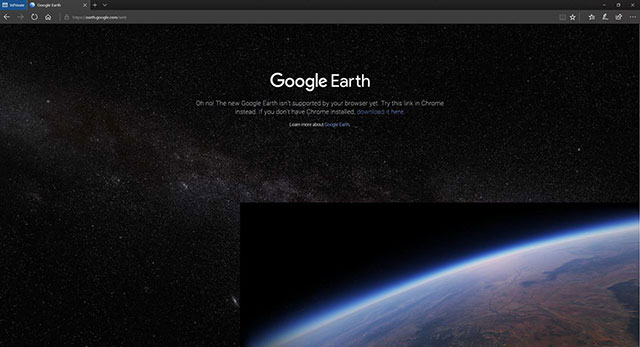
Many Google applications must be used on Chrome
Hangouts, Inbox and AdWords 3 are all the same when they are first released. It makes a developer at Microsoft describe Google's actions as a tactic.'When the largest web company in the world blocks its competitors, it is no coincidence that it will be a tactic' .
Googole is not alone in this 'best work on Chrome' tactic because other companies have started saying that their website runs best on Chrome.Croupon, Airbnb and Seamless are all like that, even one member of Chrome's group said that 'please don't create a website just for Chrome'. This is a useful advice but Google does not listen.
So why is there such a thing? Among many web projects at Google, only a small part requires Chrome in a certain stage of development, mainly due to resources and technology limitations, 'said Ben Galbraith, director. Chrome Web Platform said. 'We are always trying to overcome these limits because we believe that open web is very important to get a better web world.'
Most likely this is merely a matter of resources at Google and other companies, not a plot to overthrow Firefox or Edge. Google employees still use Gmail, Google and Chrome, as are most of their customers. So I can understand why they optimized for Chrome. Google's Chrome team is still a big competitor on the web, but if all of Google's other services are optimized for Chrome it doesn't look good.
'There is a problem that Google developers often create new web standards, they are very active when developing new features for the web,' said Jason Ormand, an engineer at Vox Media. 'They send proposals and upload them to web standards organizations like W3C to make them standard'.
That means Google is the first to use those web standards. With so many developers using Chrome for web development, the problem became much more obvious.
It's hard to make this Chrome-only-available status better. Google stopped using WebKit and switched to their own Blink engine a few years ago, with many optimizations for the source library, framework and many other factors that could cause errors on other browsers.
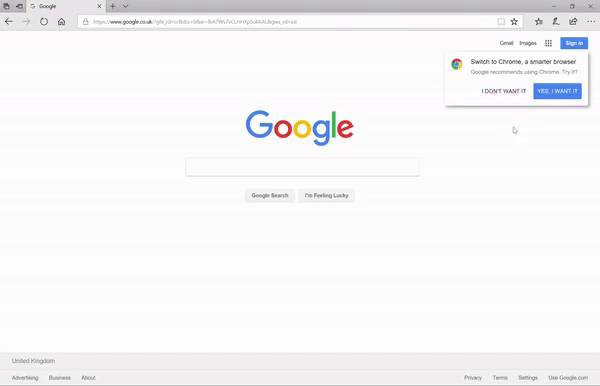
The call turned to Chrome while using Edge
You will see this if you use Safari, Firefox or Edge to open pages that the developer only uses on Chrome, encouraging Chrome to load much easier than completely rewriting. The developer also spent years optimizing for Chrome and making changes and fixes only available on Chrome.
Google also controls the most popular sites in the world, often used to promote the use of Chrome. If you visit Google.com on a non-Chrome browser, you'll see up to 3 times the invitation to download Chrome. Google also extends that message to display the whole page when it is necessary to promote Chrome in a certain area. Microsoft is also using the same tactic to convince Windows 10 users to use Edge.
- Microsoft deletes Google Chrome from the Windows Store
- What chance for Edge to overcome Chrome becomes the standard browser for businesses
The problem for those who are open to the web is that Google is starting to ignore the principle that made them available today, by limiting the service to Chrome only. This is just the beginning and the recent Google or YouTube TV applications only used on Chrome will not be the final applications.
'This is unacceptable,' said Jen Simmons, a member of the CSS team and developer at Mozilla, when it comes to Groupon optimizing pages for Chrome. 'Web developers, you can do better. Developed on the web, not on a browser. Otherwise you will make it difficult for your users. '
John Gruber, author of the blog Daring Fireball, founded the Markdown release format, warning there will be more. 'Now there are too many things to use only on Chrome,' he said, 'if you don't think Google is building a Chrome monopoly platform, your head is probably in the sand.'
Still there is hope. 'Helping create a habit of supporting open web development is still something that Chrome and Google groups generally aim for in 2018,' said Ben Galbraith. That's what Chrome and the web development team at Google need to follow to avoid creating pages that can only be used on Chrome.
Microsoft may have celebrated the departure of Internet Explorer 6 but if not careful, Google will also step into that crash.
See more:
- Instructions and things to know when using the latest version of all browsers
- Too embarrassed, Microsoft engineers had to install Google Chrome in the middle of the presentation because Edge kept crashing
- Is Microsoft Edge really safer than Chrome or Firefox?